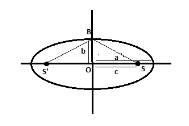Question
Question: Find the eccentricity of the ellipse \(\dfrac{{{x^2}}}{{{a^2}}} + \dfrac{{{y^2}}}{{{b^2}}} = 1\) whe...
Find the eccentricity of the ellipse a2x2+b2y2=1 where B is an end point of a minor axis, S and S’ are foci such that △BSS′ is an equilateral triangle.
Solution
Ellipse of the form a2x2+b2y2=1 is the one with semi major axis of length a parallel to x axis and semi minor with length b parallel to y axis. Eccentricity of an ellipse is the ratio of the distance between the centre and each focus of the ellipse to the semi major axis of the ellipse. That is e=ac . Or we have another formula to find the eccentricity e, e2=1−a2b2
Complete step-by-step answer:
Step 1: Let us represent the given data as a picture:

Step 2: Given that S and S’ are foci and B is the end point of the minor axis such that BSS’ forms an equilateral triangle. Thus our image will be,

For an ellipse a2x2+b2y2=1, with semi minor axis length a and eccentricity e, the focus S=(ae,0) and S’=(-ae,0) and B=(0,b). As the triangle is equilateral, all three sides will be equal. Thus,
SS’=S’B implies (SS′)2=(S′B)2 … Formula1
where SS’ is the distance between the foci which is ae+ae=2ae and applying Pythagoras theorem in the triangle OBS’, square of hypotenuse = sum of squares of base and altitude implies,
(S′B)2=(OS′)2+(OB)2 =(ae)2+b2
Thus formula1 will be reframed as, (2ae)2=(ae)2+b2
Step 3: Simplifying the above we get,
4(ae)2−(ae)2=b2 3a2e2=b2
As we need the eccentricity e, we solve with respect to e.
3e2=a2b2 … Formula2
Step 4: Recalling the formula for eccentricity of an ellipse a2x2+b2y2=1,
e2=1−a2b2… Formula 3
Substituting Formula 2 in Formula 3 we get, e2=1−3e2
Implies
4e2=1 e=41
e=21
Final Answer: Eccentricity , e=21
Note: Other form of ellipse is b2x2+a2y2=1with the major axis along y axis and minor along x axis. Its foci will be (0, ae) and (0, -ae). Thus in general, the ellipse centred at (h, k) can be represented by the formulaa2(x−h)2+b2(y−k)2=1 or vise versa according to the axis where the ellipse is oriented.
